“Why did you want to do this mission with me, father?” Atreus asks after one of the many optional tasks. Kratos growls a bit, but doesn't dare to show the back of his tongue. It's Mimir, the severed head full of funny stories, who finally breaks the silence: "He just wants to spend some more time with you." It is also a perfect metaphor for God of War Ragnarök.
Because yes, the successor to the 2018 reboot essentially feels like more of the same. But that God of War was so good that spending more time in this world is absolutely no punishment. If you really don’t want to know anything about the game, read this one sentence before closing this page: anyone who enjoyed the previous game will be completely satisfied with Ragnarök.
But Mimir’s quote also applies in another way, namely because of the emotional underlay. Ragnarök focuses almost all his arrows on the story and the development of the relationships between characters. Scenes seem to have been written on purpose to make you cry, and dammit, they work damn well too.
God of War Ragnarök starts in the same place as the first part, namely at home. Kratos and Atreus have been hiding for a few years because everyone is out to get them. Freya is angry that they killed her son Baldur, Thor is angry that his sons did not survive and supreme god Odin is angry because… well, because Ragnarök is coming, the prophesied end of the world.
Atreus is tired of waiting and eager to discover who he is and what part he plays in all the prophecies. Shouldn’t he be saving the world, or at least helping with something? What follows is an immersive adventure in which everyone learns something about themselves. Can you break free from prophecies and expectations to become who you want to be? Are you in charge of your own destiny?
In this grand pantheon of quarrels between gods, everything feels very personal. Kratos is no longer as he used to be on a murderous crusade to kill all the gods, but is willing to talk things through and avoid violence, if this keeps his son safe. The growth that Kratos is experiencing as a human being is enormous, sometimes even unbelievably large. Not that he is now whining endless monologues, but the Kratos who only wants to drink blood is definitely a thing of the past.
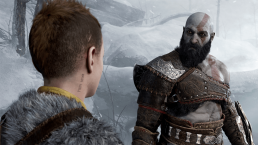
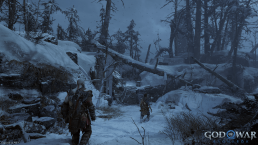
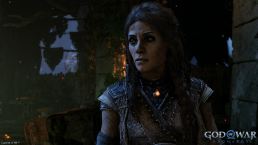
The focus is on personal interests and motivations, which impressively seeps through even in the side missions. The game again has a number of open hub worlds, in which you can explore somewhat freely. Ragnarök isn’t an open world game all of a sudden, but just like in 2018’s God of War, there are optional areas where you can find additional content if you feel like it.
You’ll be triggered more than ever to sink your teeth into it, as you’ll be rewarded with bits of story and emotional moments surrounding the main characters. For example, in the dwarf kingdom of Svartalfheim, Mimir asks you to dismantle construction sites, because in the past he helped Odin turn the dwarfs into slaves of sorts. He wants to correct his mistakes from the past, which adds an extra layer to this fairly simple job.
In any case, the many characters are the biggest plus of the game. Returning favorites such as Mimir and the dwarfs Brok and Sindri, as well as new friends from the gods realm impress. The acting is top notch, with Danielle Bisutti as the highlight. Her broken Freya swings between limitless anger and heartbreaking grief, and is a joy to watch.
In addition, the portrayal of Odin is a bold choice that turns out fantastic. Between large and taciturn muscle masses like Kratos and Thor, Richard Schiff plays the supreme god as some sort of mob boss who relies more on his brain than on sheer strength. It makes him an endlessly intriguing antagonist who is always two steps ahead of you.
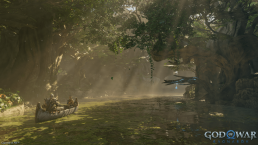
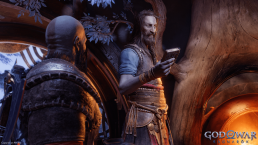
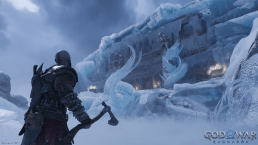
This story is again brilliantly portrayed by fabulous camera work, where no cuts are ever made in scenes. Everything is one take, which makes the adventures of Kratos and Atreus even more personal. You really feel like you are staying by their side and going out together. It also provides the necessary calmness, because the camera rests on faces for a long time. When there is an Important Conversation, you get all the nuances on the faces of the actors.
This time, the camera gets a little more space to capture other storylines as well. Ragnarök has a lot of creative tricks in store to portray the whole in a surprising way and to let everything melt together perfectly. Director Eric Williams deserves a big compliment for his sometimes daring, but certainly successful choices in the script.
You might notice that this action-adventure review isn’t about action for 12 paragraphs. This game relies so much on the story that the developers themselves sometimes almost forget that there is still a fight to be made. Quick, throw another group of meaningless enemies at the player! You are regularly confronted with small fights, just because the previous fight was so long ago.
That sometimes breaks the pace of the game, especially if it starts to feel like a must. Some battles and environments are even exactly the same as in the previous game. “Hey, remember this great enemy? Well, there it is again!” Fortunately, the total amount of different enemies has increased, making the game more varied in the end.
It shouldn’t spoil the fun too much, especially because the combat is so very good and tight. Little has actually changed since the previous game, but that’s not a bad thing at all in this case. The ax and double chain swords feel great as ever. You have total control over Kratos and all his moves, the controls never get in your way and the combos flow effortlessly from your fingertips.
New additions to your arsenal are welcome, but not a major revolution. For example, you can now charge your weapon before starting a combo for an extra dose of ice or fire. Later in the game you can choose to focus more on long-range combat, but hey, who wants that when you’ve got your hands on those iconic melee weapons?
You also have little time to get bored of the combat, because the game contains more epic moments and battles than before. Although Ragnarök, like his predecessor, has a slow start, the journey is more than ever filled with memorable confrontations.
Despite the above criticisms, God of War Ragnarök is a beautiful game that feels epic and grand in everything. The game is finished to perfection, all animations and details are correct and bugs are hardly or not present at all. The worlds are breathtaking at times, full of small details that bring the game all the way to life. We might have liked to see a bit more of some environments, because not all areas can be explored at your leisure.
But you really can’t complain about a lack of content here. The story rages across your screen in about twenty hours, but if you also want to explore all optional missions, you will certainly lose twice that, and maybe even more.
According to the developers, this God of War series will not be a trilogy and Ragnarök is the closing of this story. Strangely enough, it does feel like a trilogy. The game is so packed with surprising story moments that it feels like you’ve played two entire games in one. As if the studio had planned the story of a trilogy, but crammed the last two parts into one fantastic package.
Lesser gods would collapse under their own weight in such a case, but with Ragnarök that is absolutely not the case. The game is overcrowded, in the most positive way. It brilliantly weaves together all of its storylines and grandiose action, never having you huffing and puffing at the clock. After thirty hours of playing, we just want to spend more time in this world. Fortunately, there is still plenty to do.
God of War Ragnarök is available for PlayStation 5 and PlayStation 4. For this review, the game was tested on a PlayStation 5.
Score:
9,5
+ Combat remains excellent.
+ Beautifully beautiful and compelling.
+ Phenomenal and emotional acting.
+ Great story, creatively portrayed
– Puzzles slow things down.
– A bit too linear at times.